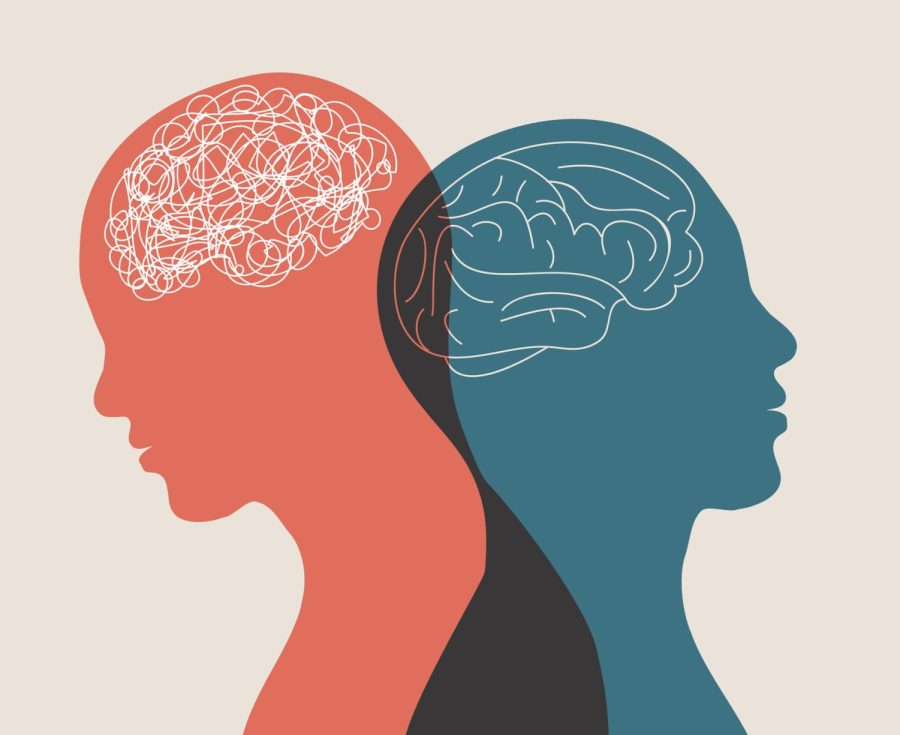Opinion | Don’t glorify mental illness
Suddenly, mental health struggles are trendy. That’s not a good thing.
February 26, 2023
I have generalized anxiety disorder and obsessive-compulsive disorder. Jealous?
I’ve dealt with generalized anxiety disorder my whole life. I remember being at school in first grade and crying to the point where my tear glands dried up because I was fearful my parents were dying.
At the time, I felt abnormal and was treated as such. Fears that were very real to me were brushed aside by adults who told me to be stronger or tough it out. I don’t think I heard the term “anxiety disorder” until I was 11 years old, to which I responded, “I think I have that.”
Since then, the public has started taking mental health a lot more seriously. People view mental illness as actual illness, and it’s a lot less stigmatized than it once was.
This new-school outlook on psychological well-being has encouraged more people to talk about how mental illness affects them.
Celebrities are more open than ever about their mental health struggles, and every time a new celebrity speaks out about their issues, they’re heralded for their bravery.
But I can’t help but feel like mental illness is sometimes glorified and that having some form of psychological ailment is suddenly cool or in fashion.
It’s not like the glorification of mental illness is anything new. For years, we’ve seen TV tropes like the detective with OCD or something resembling autism that gives him an uncanny ability to solve crimes.
I’m not innocent in all of this. When I, a musician, first learned about the mental anguish some of my favorite musical artists had gone through, there was a real part of me that stupidly thought, “I wish my mental health was worse so that I could create art as great as theirs.”
Very unhealthy, yes?
Social media platforms like TikTok are filled to the brim with videos containing grossly oversimplified representations of mental illness that carry a tone of, “Look at me with my anxiety, aren’t I so quirky and relatable? I’m just like you.”
Mental illness isn’t a personality quirk. It’s a peril that gets in the way of self-betterment, career aspirations, personal relationships, overall happiness, and the ability to get through a day. So, when people play up their psychological strife for their own personal gain, it feels invalidating to those of us who have to deal with it every day.
Because of my OCD, I find it mentally grueling at times to perform a task without repeating certain actions.
I’ve retyped letters repeatedly just writing this piece. I’ve made intentional grammatical errors that I have to go back and correct later. This is because the anxious part of my mind has convinced me that if I put a hyphen where a hyphen should be, something terrible will happen to me that will alter the course of my life forever.
I know thoughts like that aren’t true. Use of a hyphen has no effect on whether I’ll get into a face-disfiguring car accident. But if I go against the impulse, apprehension sets in.
So, when people come limping in, flaunting their self-diagnosed mental illness for cool points, it can be a little bit frustrating.
For some people, it’s not enough to just feel sad or anxious, which are perfectly normal human emotions. It must be something more dire like depression or an anxiety disorder.
I’m not saying we shouldn’t talk about mental illness. We absolutely should. Let’s even joke about it. But while we do that, let’s make sure that we don’t glorify it.
Columns reflect the opinions of the authors and are not necessarily those of the Editorial Board, The Daily Iowan, or other organizations in which the author may be involved.















